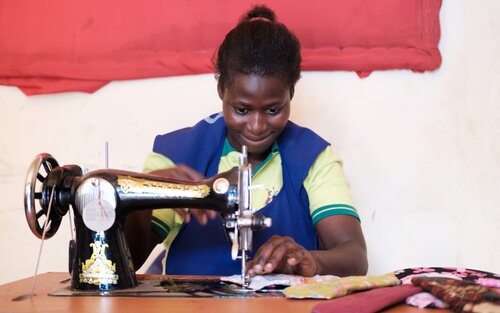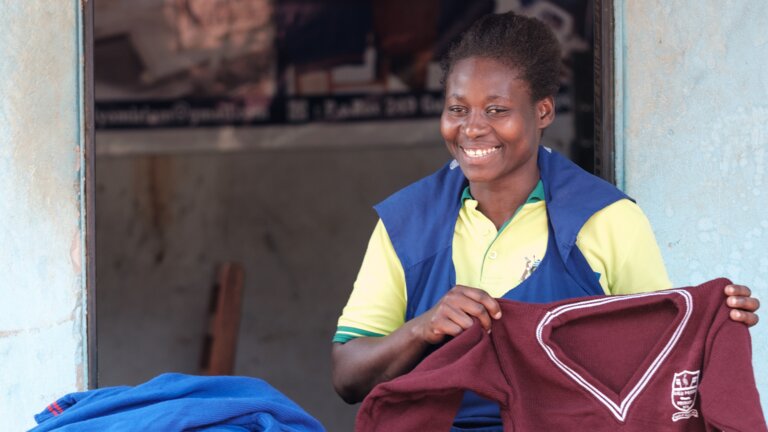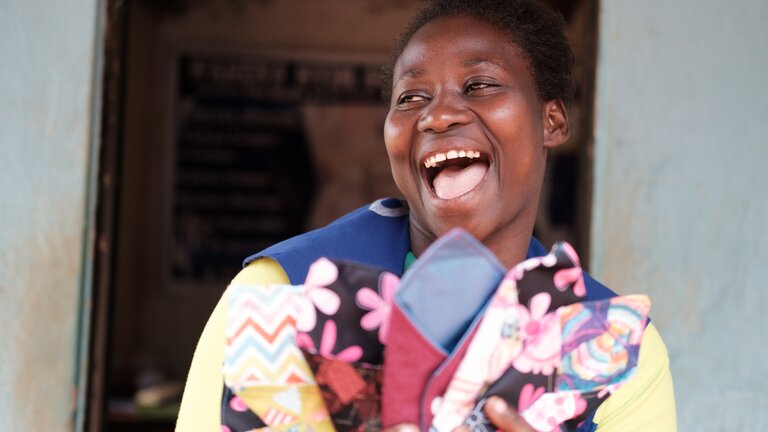Building A Business Empire One Stitch at A Time
In the heart of Gulu City at the Gulu Disabled Persons Union office, Miriam Apiyo sits at her workstation, making a sweater on the knitting machine. Born with a psychosocial impairment, Miriam has worked hard to ensure that she and other people with disabilities can be self-sufficient. Miriam took 6 months knitting course in 2015 after which she formed a knitting group comprising 7 people with disabilities: 2 people with psychosocial and 5 physical disabilities. “I intentionally sought out people with disabilities to form the business group because I wanted to create opportunities for them to also realise their potentials.”

In the heart of Gulu City at the Gulu Disabled Persons Union office, Miriam Apiyo sits at her workstation, making a sweater on the knitting machine. Born with a psychosocial impairment, Miriam has worked hard to ensure that she and other people with disabilities can be self-sufficient. Miriam took 6 months knitting course in 2015 after which she formed a knitting group comprising 7 people with disabilities: 2 people with psychosocial and 5 physical disabilities.
« I intentionally sought out people with disabilities to form the business group because I wanted to create opportunities for them to also realise their potentials. »
Miriam took steps to register the group as a business and as she did this, she sought business opportunities. Miriam landed 2 contracts to produce a total of three hundred sixty sweaters (360) for St Joseph’s College Layibi, a secondary school in Gulu district.
To receive payment, Miriam was required to have a TIN which she did not have due to the registration procedures. She was supported by an organisation that offered its TIN on the condition that it also takes part of the profits made from the knitted sweaters. This gave Miriam more drive to fast-track her business registration to ensure that she had full ownership and rights to her business.
Miriam scouted and acquired another contract to produce 200 sweaters for Gulu Prisons Primary School. She planned to use the payment from St Joseph’s College Layibi sweaters to buy raw materials but before she could deliver her consignment and get paid, schools were closed due to the COVID19 pandemic.
The administration at Gulu Prisons Primary School encouraged her to proceed with the production of the school sweaters despite the lockdown, promising to pay for them once students returned to the school.
Miriam did not have enough capital to buy the yarn needed for the sweaters, and as she thought of where to get the capital, she was contacted by Alan Nume, a Disability Inclusion Facilitator working with Light for the World. Pleased by her hard work and business acumen, he registered her as one of the entrepreneurs with disabilities to receive funding aimed at reviving their businesses amidst the COVID19 pandemic.
Miriam received the money and bought materials which she is using to make the sweaters to supply to Gulu Prisons PS. On the sale of the sweaters, Miriam projects to make a profit of one million five hundred (1,500,000) shillings.

Expanding Business Streams with Reusable Sanitary Pads
Miriam not only received funding but also training in making reusable sanitary pads, facilitated by Light for the World. “I had never heard of reusable sanitary pads, but after the training, I knew that they would be a very profitable source of income since they are very essential in ensuring personal hygiene for girls.”
To maximise sales of the pads as well as get sweater-making contracts, Miriam engages in a multifaceted marketing strategy. She moves into the community and during different gatherings, talks about the importance of reusable pads. She also moves to schools with samples of her pads and sweaters. Miriam also uses her platform on the radio talk show to advertise her business and skills.
With the advertising Miriam has made, she has been able to carry out several trainings in sweater knitting for different groups of people. After the training, she writes her reports and gets support in typing them out from a nearby stationery shop. This is a means of her accounting that will help her track her journey to financial success.
Miriam is enthusiastic about the future. “With these experiences and skills I got from Light for the World, I want to get more contracts from schools to make sweaters and provide reusable pads. I also want to grow my business into an empire that I am managing. I know I can do it.”
Light for the World through its COVID19 response program has been able to support entrepreneurs with disabilities such as Miriam, to rebuild and revitalize their businesses, thus changing their lives.

